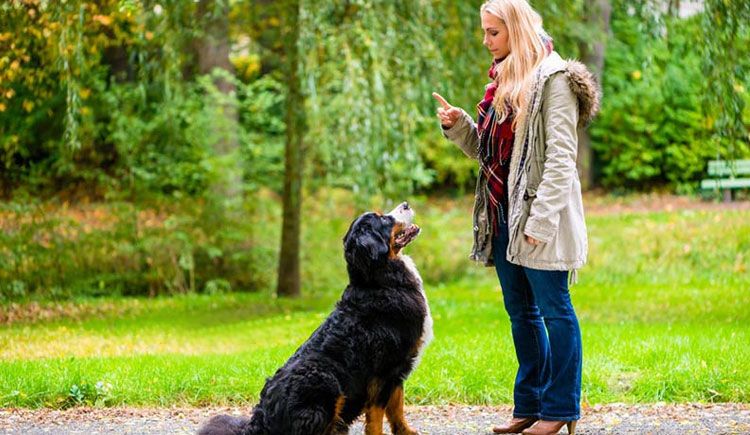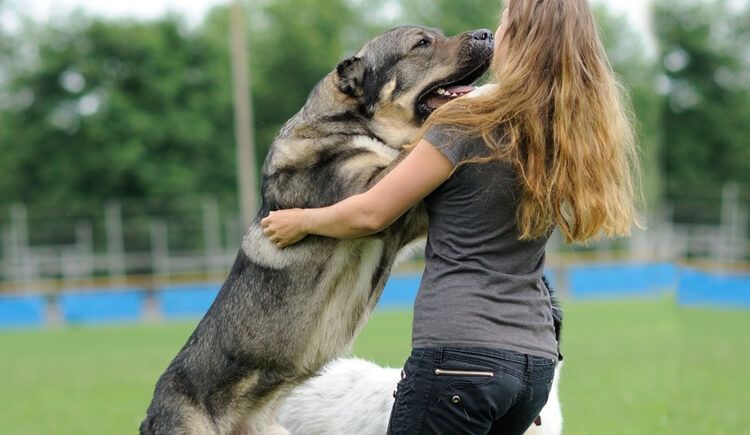Just as feeding your pal daily and taking care of all his needs is important, teaching him some basic dog commands in pivotal too. Some of the common commands which must be taught are listed below. Make sure to go through them and try and inculcate it in your fuzzy friend.
1. Name Recognition
It’s important to start off with the name recognition command. Making your pal get used to his name is highly essential for obvious reasons. It helps in better communication with your canine and eases the process of teaching him other commands.
2. Sit Down
The “sit down” or simply “sit” command helps to you control your dog in situations where he finds it impossible to control. For example, when you get ready to feed him his meal, you will notice an extreme excitement running down his spine. In such a situation, the sit-down command is very useful.
3. NO
Dogs tend to do things which sometimes us humans loathe; like chewing our shoes, eating food off the table, etc. Hence, the “NO” command is beneficial in controlling such behaviors in your dog. This helps to stop your furry pal from doing whatever he is doing.
4. Go Fetch
Our furry pals love playing especially with human company. They love it when you throw (a ball or a Frisbee or a stick) and command them to go fetch it. This not only helps him learn the “go fetch” command but is also a wonderful way to train him to pick things up. It can come in handy in the future, who knows!
5. Bark
Barking comes naturally to most dogs and is generally self-taught. When they spot a stranger whom they meet for the first time, they tend to let out a bark. While most dogs would do such a thing, some dog breeds have to be taught the “bark” command. This command is helpful in many ways especially for police/watchdogs.
6. Eliminate
To prevent your dog from doing his business all over the house and on his own sweet time rather than yours, the eliminate command becomes a lifesaver. Teaching your pal the eliminate command will enable you to schedule his bathroom timings according to your suitability and avoid a messy house situation.
7. Come Here
Dogs can be very lazy at times and you might notice them not running towards you after you walk in home from a long day at work. In situations like this, the “come here” command helps in calling out your doggie towards you. This command is helpful in many other ways too and hence, should be taught to your buddy.
8. Lie Down
The “lie down” or “down” command is quite similar to the “no” command which prevents your pooch from unwanted behavior like jumping on people, running around the house, etc. This helps in maintaining good behavior and keeps your furry friend well under control.
9. Stay
Also known as the “wait” command, this is helpful in teaching your buddy to stay put in one place until you are ready. This is very useful when crossing a road or a street. It also boosts your pal’s alertness.
10. Drop It/Take It
When you want your pal to drop something off from whatever he is holding in his mouth, the “drop it” command comes in handy. Similarly, the “take it” command can be used when you want your munchkin to grab something.
11. Jump
The “jump” or “leap” command can be taught using the “stay” and “come” command and by adding a few obstacles like hurdles. Jumping helps your pal stay fit and strengthens the legs which in turn reduce the chances of succumbing to joint problems at a younger age.
12. Run
Running helps dogs in so many ways. It not only helps in keeping their bodies in great shape but helps in strengthening the muscles and joints. The “run” command is one of the widely used commands by dog parents across the globe.
Along with giving basic training, you should also take your pal in protecting them from parasites such as fleas & ticks. We recommended using preventives so that they can freely focus on your training.





